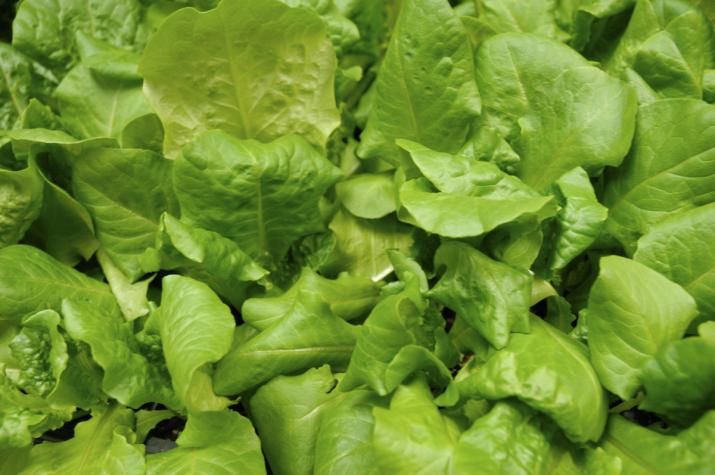

Container gardens to supply your salads
COLUMBIA, Mo. – It’s easy to grow lettuce in container gardens, says Kim Martin, manager of Tiger Garden, the student-run floral shop on the University of Missouri campus.
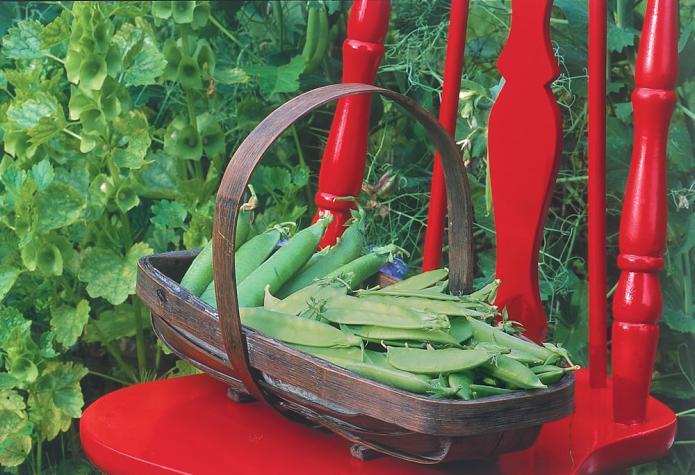
It's time to plant peas
COLUMBIA, Mo. – Peas will never be considered an exotic food, but they’ve been cultivated for at least 5,000 years. This ancient plant is a cool-season vegetable that needs to be planted early.
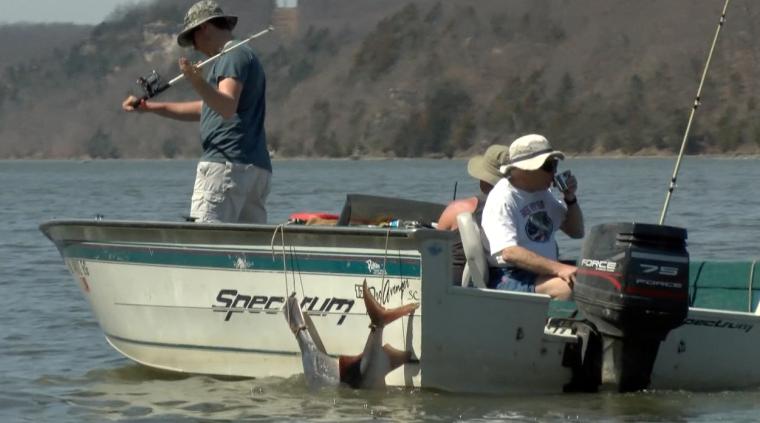
Big fish
WARSAW, Mo.– These fish aren’t biting. Paddlefish never do. They eat by filtering plankton as water passes through their gills. But here on the Osage Arm of the Lake of the Ozarks, paddlefish do put up good fight after being hooked.“It feels like all of a sudden you just slam into a wall,” says Mark Bagwell after snagging his first paddlefish. “It’s a lot bigger than the trout in Georgia,” he said.
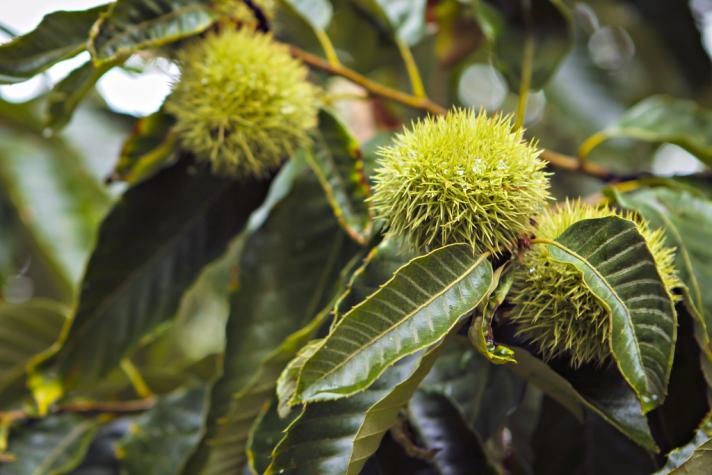
Cash does grow on trees
Missouri's fertile river hills are ideal for chestnut orchards, offering farmers a profitable, sustainable crop with growing market demand.
Cold rain right after planting causes problems
COLUMBIA, Mo. – It may be too early to think about replanting corn yet, but it’s a good time to look at guides from University of Missouri Extension or seed dealers, said MU Extension agronomy specialist Bill Wiebold.

Beautiful bulbs
COLUMBIA, Mo.– The long, harsh winter coupled with last fall’s drought caused a lot of damage to evergreen trees.

Boots on the Green
GRANITE CITY, Ill.– After Bobby Hutchinson lost his left leg in 1991 during Operation Desert Storm, he thought he’d never play golf again. “I just kind of had it in my head that that chapter in my life was over,” says Hutchinson, who was a heavy equipment operator in the U.S. Navy Construction Battalion when his leg was crushed in an accident in Saudi Arabia.
When grass seed heads appear, hay quality drops
COLUMBIA, Mo. – So far, it’s a bad hay year. Cool weather, lack of sun and dry soil slowed grass growth.Dry matter per acre is about one-third of what we expect this time of year, says Rob Kallenbach, University of Missouri Extension forage agronomist.He spoke to regional extension specialists in a weekly teleconference.“There’s hope,” he adds. “With warmth and rain, we can still grow lots of good hay. It will take management to make…
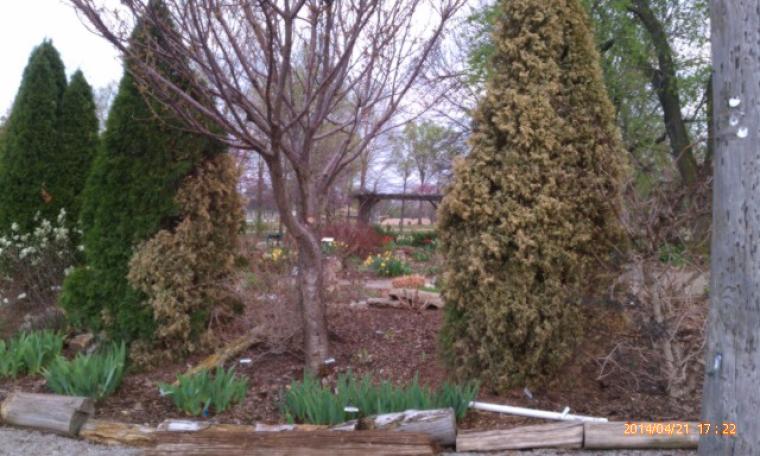
Pruning winter-damaged evergreens
COLUMBIA, Mo.– The long, harsh winter coupled with last fall’s drought caused a lot of damage to evergreen trees.
Well owners need to regularly test water
COLUMBIA, Mo.– If you use well water for cooking and drinking, you should regularly test the water for contamination, says a University of Missouri Extension water quality specialist.“Bacteria is one of those things that is easy to control, but it is something you need to check for,” says Bob Broz. “The best time to test a well for bacteria is in late spring or early summer during wet weather.”
MU tool helps farmers decide on pasture insurance
Use an online tool to see if pasture insurance fits your farm based on daily rainfall and coverage options.
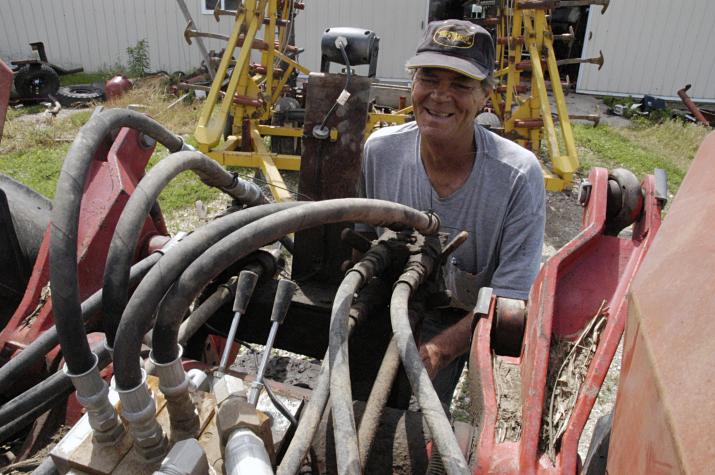
AgrAbility program from MU helps farmers after injury
BETHEL, Mo –Chris Allen wanted out of the bed. He argued with hospital staff that he needed to go home to harvest crops, feed cattle and cut firewood to heat his farmhouse. The lifelong Shelby County farmer had a brain aneurysm that resulted in a life-threatening hemorrhagic stroke on his farm in August of 2010. But the thought of crops in the field nagged at him while he was a patient at Barnes Jewish Hospital in St. Louis and…
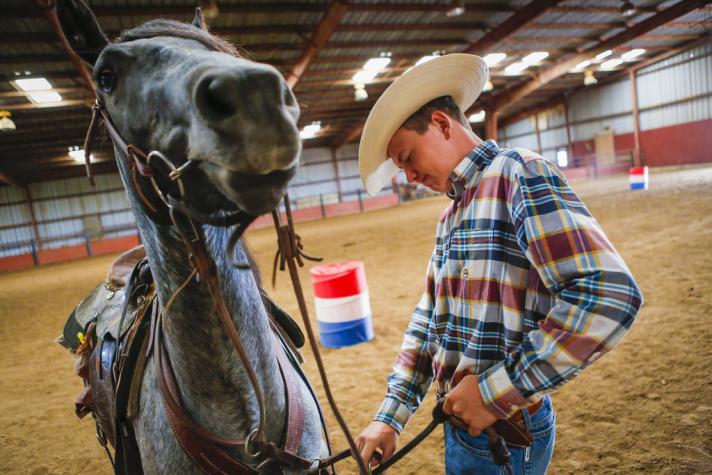
AgrAbility program helps horse trainer begin ride of his life
NEW FRANKLIN, Mo. – Zane Volkmann always wanted to be a horse trainer. A serious accident weeks before his senior year of high school slowed his gait, but it didn’t throw him. He cinched up his saddle and began the ride of his life. “You just pick your lip up off the ground and go ride,” he said.
Deep tillage buries seeds of weeds that can’t be killed by herbicides
COLUMBIA, Mo. – Deep-six weed seeds to control pigweeds and other herbicide-resistant pests in soybean fields.“I’m not advocating a return of moldboard plowing,” said Kevin Bradley, University of Missouri weed scientist. “Burying weed seeds with deep tillage does provide one more tool in dealing with resistant pigweeds.”
Drones draw interest to crop scouting and other new farm uses
COLUMBIA, Mo. – Remote sensors can play a big part of farming in the future. Those sensors can be on a 10-foot pole or a satellite 250 miles out in space.The sensors of most interest at an agriculture technology fair, July 17, were on an unmanned aerial vehicle, or drone, that looks like a toy helicopter. Farmers and agribusiness came to see, learn and do.
Building beef cow herd requires quality management and genetics
Strong genetics and careful management help producers build profitable beef cow herds with healthier calves and higher returns.
Don’t turn up your nose at turnips
COLUMBIA, Mo. – You may not be able to squeeze blood from a turnip, but you can easily grow this tasty and nutritious vegetable.Turnip is an ancient vegetable that’s been cultivated for thousands of years. While turnips can be found in European cuisine, David Trinklein, horticulture specialist for University of Missouri Extension, says turnips don’t often show up in American cuisine.“Turnip is an underappreciated and under used fall…
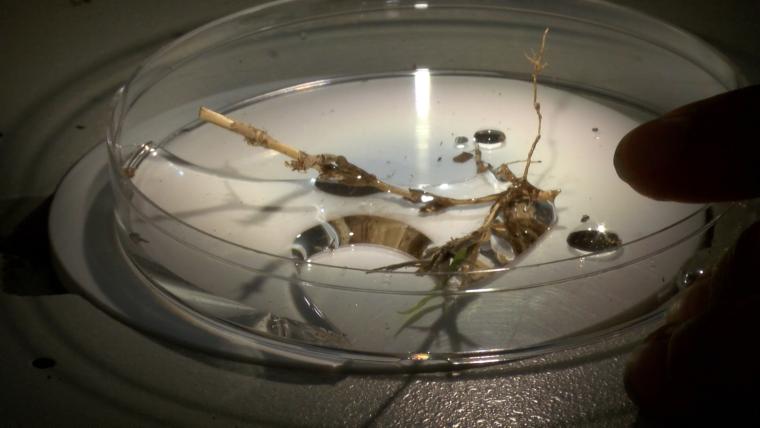
Aid for ailing plants
COLUMBIA, Mo. – If you have the sniffles or a bad infection, a visit to your doctor can usually put things right. Plants can get sick too and the University of Missouri Plant Diagnostic Clinic is where you can turn for help.

Teachers learn energy lessons to pass on to students
Columbia, Mo. – Sara Johnson, a biology teacher at Montgomery County High School, has some new lessons about energy for her students this fall.
How much rent should I get for my farm?
LINNEUS, Mo. – University of Missouri Extension’s upcoming Farm Lease Program helps landowners and renters make decisions about renting farm ground.
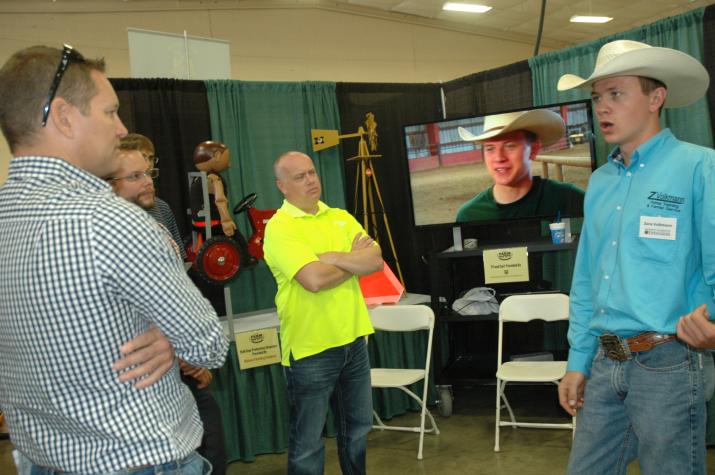
Wear a helmet when horseback riding
COLUMBIA, Mo. – Horse trainer Zane Volkmann calls his riding helmet an “anti-watermelon cracker.” Volkmann, who suffered a brain injury two years ago while riding, spent part of his summer college-related internship encouraging horseback riders to wear a helmet. His most recent appearance was at a safety expo sponsored in part by University of Missouri Extension. He also talked about helmet protection in the agriculture safety booth…
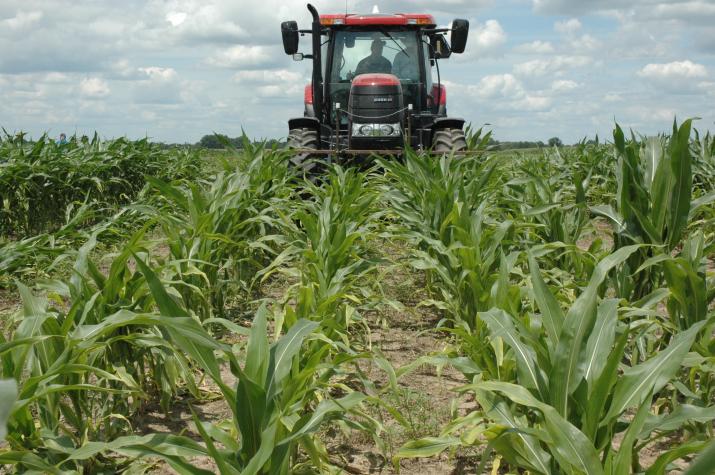
Crop sensors improve nitrogen application
COLUMBIA, Mo. – Sensor-guided nitrogen application can save corn producers money and increase yields, says Peter Scharf, University of Missouri Extension soil scientist. Scharf showed how crop sensors diagnose variable nitrogen needs at a recent farmer technology field day at MU’s Bradford Research Center. In the last decade, on-farm demonstrations have been carried out in more than 100 cornfields and a dozen cotton fields in Missouri.
Different distillers grains may change feed rations
COLUMBIA, Mo.– Ethanol plants are getting more efficient at extracting fuel from corn, and that can affect the quality of distillers grains, a byproduct of ethanol production often used as an economical feed alternative for hogs and poultry.“They are doing some further extraction to get more of the corn oil out of distillers grains,” says Marcia Shannon, University of Missouri Extension swine specialist. “So we’re getting a little bit…
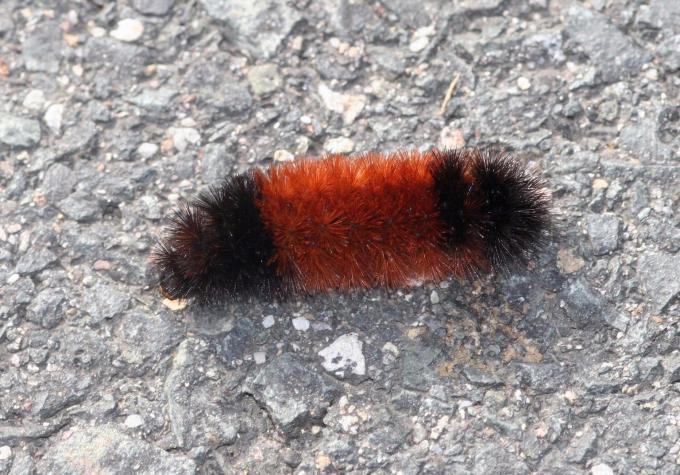
Can the woolly bear caterpillar predict the weather?
COLUMBIA, Mo. – The woolly bear caterpillar (Pyrrharctia isabella), often called the “weather worm,” is said to predict what Old Man Winter has in store. Folklore says the narrower the reddish-brown band on the caterpillar, the more severe the winter. But the width may be a better indication of the previous winter and spring than a prediction of the upcoming winter.
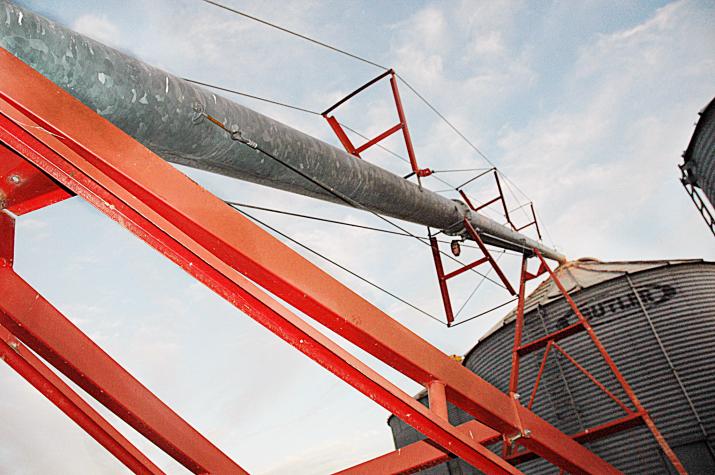
Prevent insects from infesting stored grain
COLUMBIA, Mo. – As corn yields exceed commercial storage space, farmers will likely store some of this year’s crop in on-farm bins and in unconventional ways.Stored grain attracts insects, and producers should take measures to protect their investment from insect damage, says Wayne Bailey, University of Missouri Extension entomologist.
